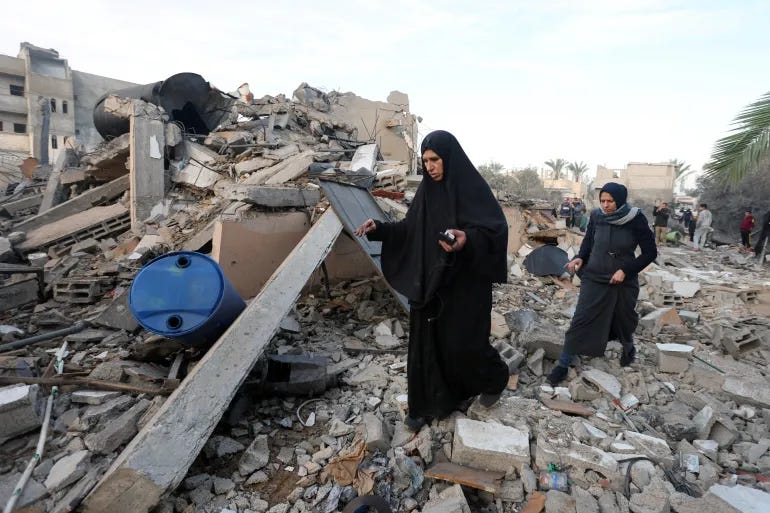Mixed Emotions as Gaza Awaits Return to Normalcy Following Israel-Hamas Ceasefire
Deir el-Balah, Gaza, and Beirut, Lebanon – In the wake of a ceasefire agreement between Israel and Hamas, Palestinians in the Gaza Strip are feeling a complex mix of relief, grief, and hope as they aw
The ceasefire, confirmed by both Qatar and the United States, includes a prisoner and captive swap and promises the return of Palestinians to their homes across Gaza. While the news has sparked celebrations, it also carries a deep sense of loss, as countless families mourn the deaths of loved ones amid what human rights groups and UN experts have called a "genocide."
For many, the end of hostilities is bittersweet, with plans to return to their hometowns and villages once possible. "As soon as there is a ceasefire, I will return and kiss my land in Beit Hanoon in north Gaza," said Umm Mohamed, 66, who tragically lost two of her ten children when an Israeli bomb hit her home in December 2023. "What I realized in this war is that your home, your homeland, and your children are all you have."
The war, which began after a Hamas-led attack on southern Israel in October 2023, has killed more than 46,500 Palestinians and left over 100,000 wounded. Israel's aggressive airstrikes targeted schools, hospitals, and camps for the displaced, causing widespread destruction. According to UN assessments, 66% of Gaza's infrastructure has been severely damaged or destroyed by Israeli forces.
Amid this devastation, many survivors, like 47-year-old medic Mohamed Abu Rai, express mixed feelings about the ceasefire. "I have mixed emotions… but I pray to God that we can return to our normal lives without feeling insecure," he said from his office in Deir el-Balah.
Remembering Lost Loved Ones
As the ceasefire nears, Palestinians reflect on those they lost. Lubna Rayyes, who was the principal of the International American Elementary School in Gaza City, mourns the death of her colleague, Bilal Abu Saaman, who was killed while rescuing people from the rubble. "Bilal was one of the best people in the world," Rayyes recalled, now living in Cairo, Egypt. "When he died, it really affected me, and it still hurts until now."
Abu Rai, who also lost his home and friends, echoed similar sentiments. He believes the true number of casualties far exceeds official counts and admitted that simply surviving the past 15 months felt like a stroke of luck. "Staying alive in Gaza was always just a matter of luck," he said.
To Stay or Leave Gaza?
While some Palestinians are eager to return and rebuild their homes, others, like 52-year-old Mahmoud Saada, see no future in Gaza. Saada, who plans to leave for Egypt with his children once the crossing opens, is exhausted by the ongoing conflict and destruction. "I swear to God I won’t return to Gaza. I’m so tired and fed up," he said from a small, overcrowded tent in Deir el-Balah.
Abu Rai shares a similar sentiment, questioning how the survivors will rebuild after enduring so many years of war. He believes the trauma inflicted by repeated conflicts has left many unable to envision a future in Gaza. "There has been so much destruction, and we are starting from zero, again. Each day we lose, we don’t get back," he lamented.
Despite these feelings, all three survivors agreed that Gaza holds a special place in their hearts. Rayyes noted, "There really is no place like home," echoing the sentiment that, for many, a return to Gaza is inevitable, despite the hardships they face.
As the ceasefire takes hold, Palestinians will have to grapple with the trauma of war, the uncertainty of their future, and the emotional pull to return to their homeland. But for now, the promise of peace offers a fragile hope, a chance to rebuild, and the hope that they may finally find the safety and security that has eluded them for so long.


